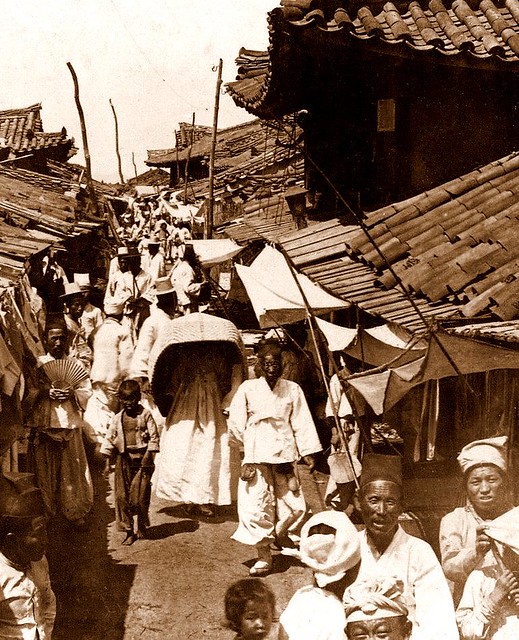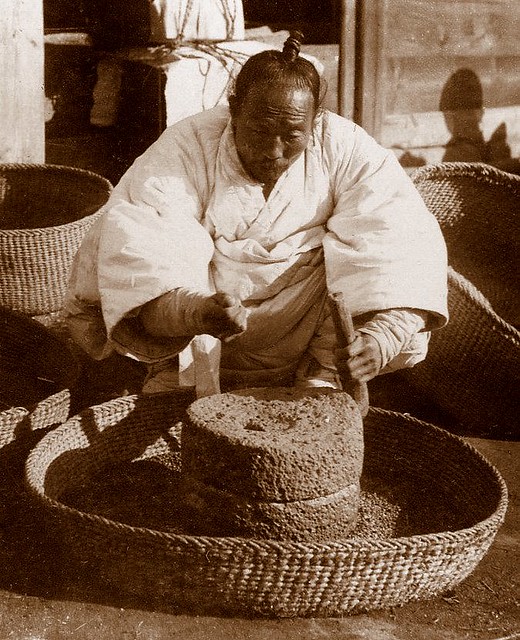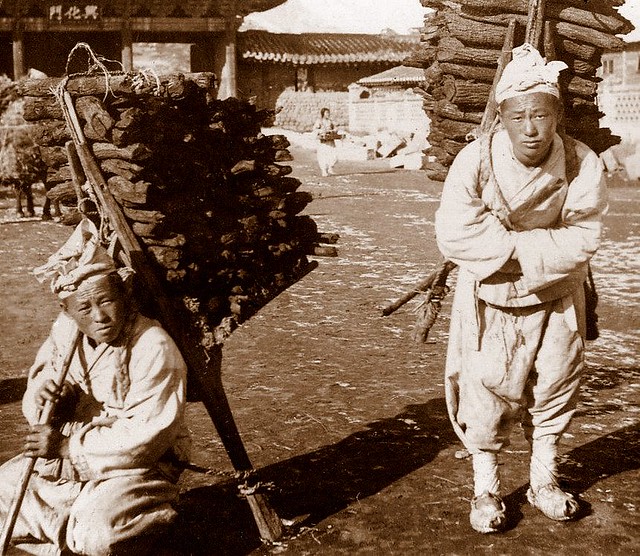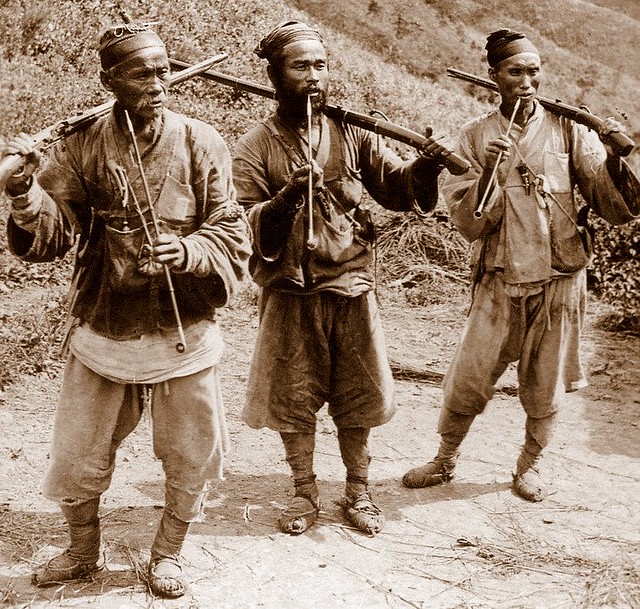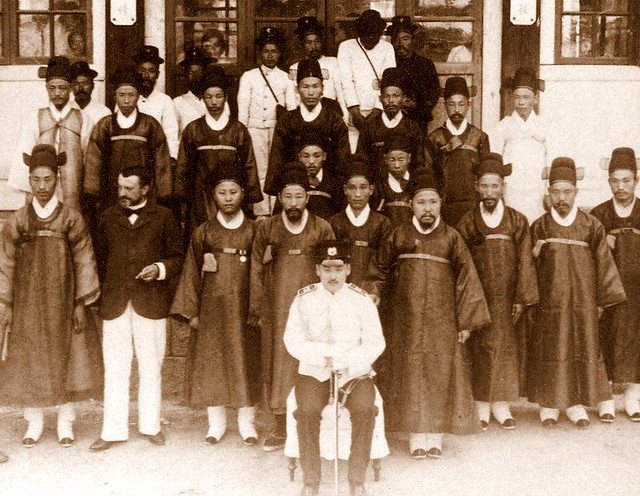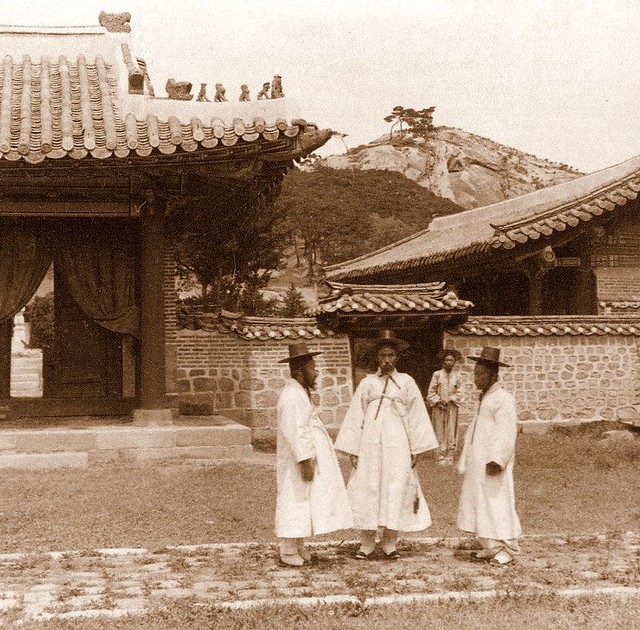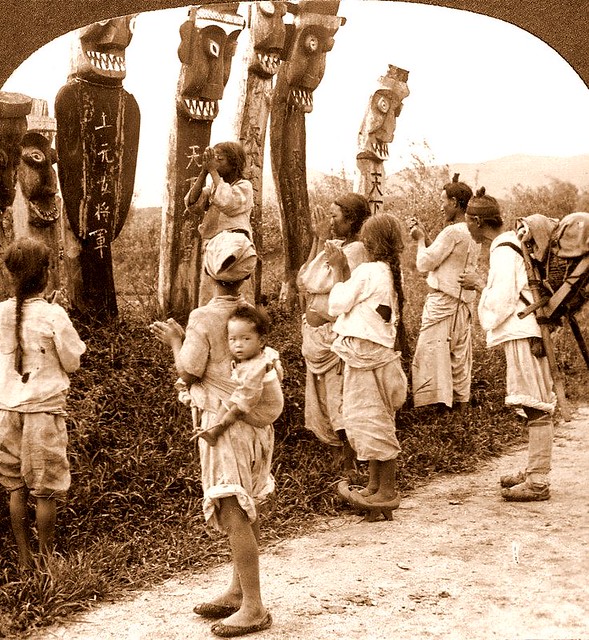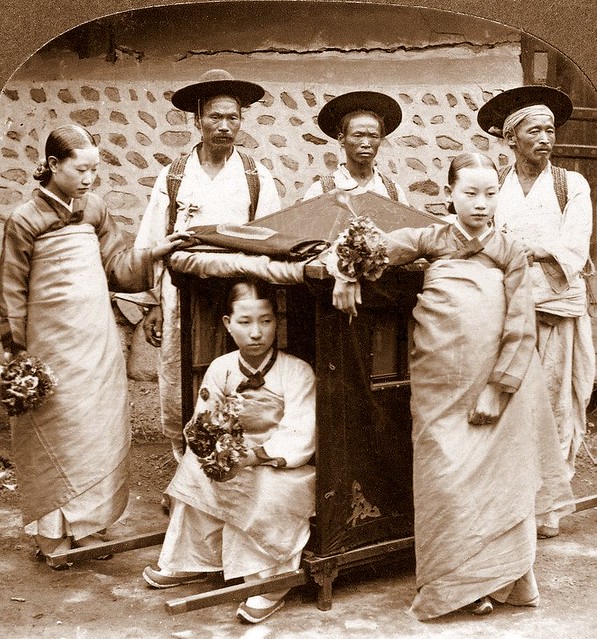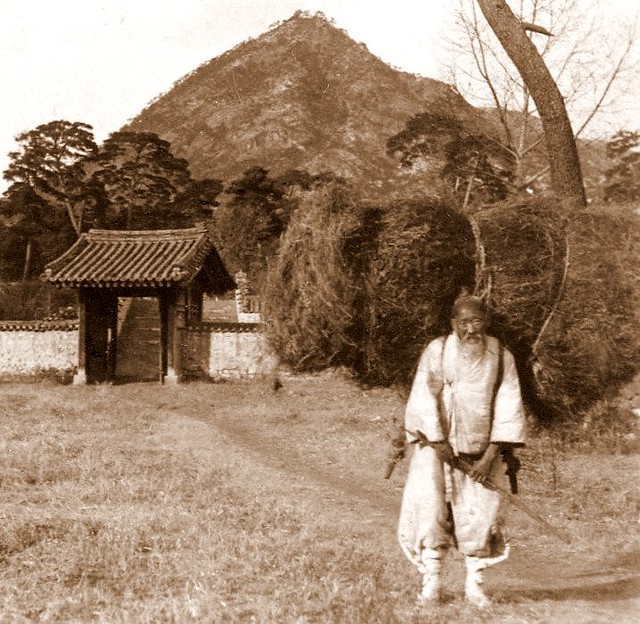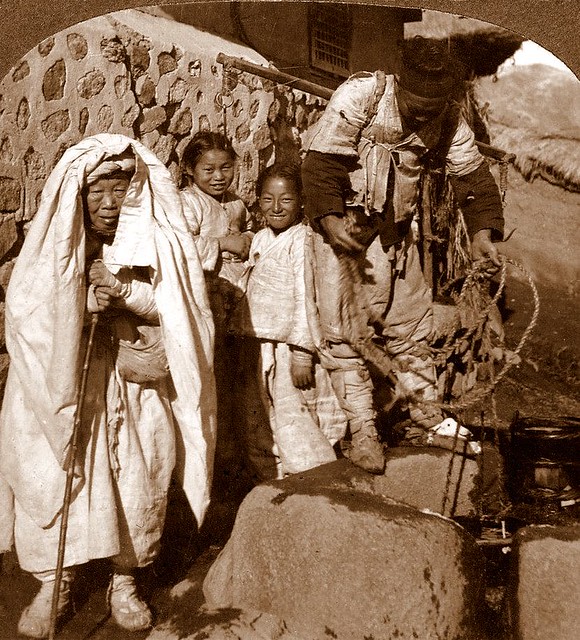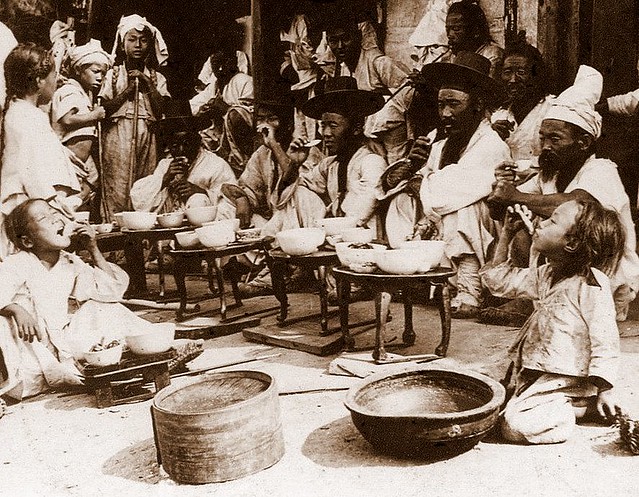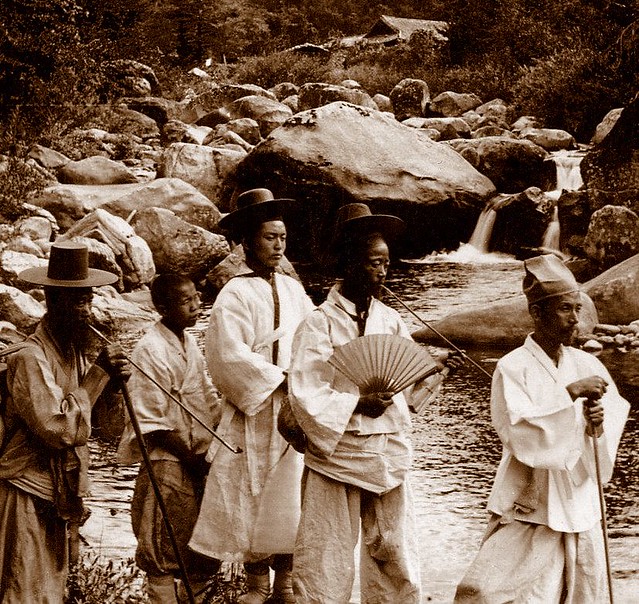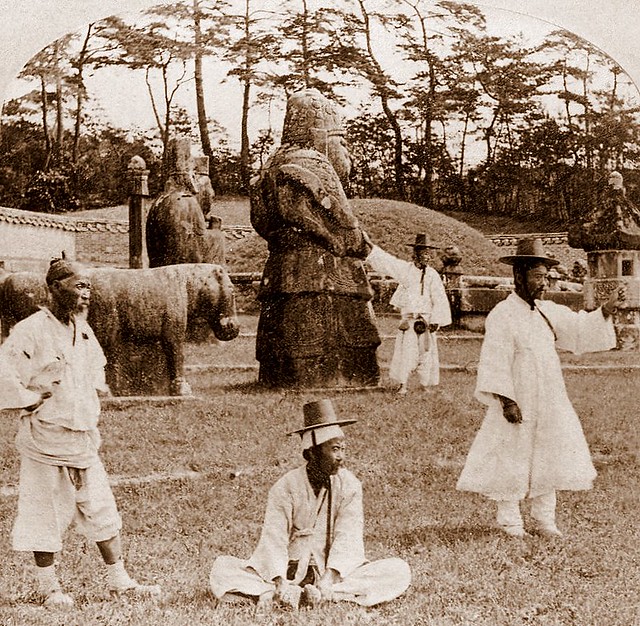|
THE OLD KOREA " Land Of The Morning Calm " [ By Elizabeth Keith ]
엘리자베스 키스(Elizabeth Keith, 1887~1956)는 동북아시아, 특히 한국의 풍속을 소재로 목판화를 남긴 영국의 여성 판화작가이다. 스코틀랜드의 에버딘셔에서 태어나 1898년에 런던으로 이사했다. 1919년 삼일운동 직후 동생과 함께 한국에 건너와 3개월 간 지내면서 동생이 글을 쓰고 자신의 그림을 실은 'OLD KOREA - Land Of The Morning Calm’를 출간했다. 아래 사진은 OLD KOREA - Land Of The Morning Calm에 수록된 사진들이다.
▲ Korean Girls Testing a New "Short Drop" Parachute Design
▲ Smokin', Gamblin', and Gossiping
▲ High Class Family
▲ Kids on the City Wall, SEOUL
▲ A Crowed Scene on a Side Street, PYONGYANG
▲ A Rustic Road Near SEOUL
▲ The Bean Grinder, SEOUL
▲ A "Greasy Spoon" Restaurant in SEOUL
▲ The Chicken Seller, SEOUL
▲ Charcoal Carriers, SEOUL
▲ Junks Along the Han River at YUNG SAN, a Logging Town Near SEOUL
▲ Two Kinds of Loads on the Streets of SEOUL
▲ Public School With a Holding Cell Under the Floor Reserved For Wild Kids, SEOUL Wonder what the little girl behind bars did to get thrown in the klink? Obviously, the pipe-smoking old teacher-sage doesn't take any crap from his young pupils. Photo by Herbert Ponting, 1903.
▲ Tiger Hunters in the Hills Outside of SEOUL
▲ Shoeing a Horse at the Blacksmith's Home, SEOUL In the past, these guys were evidently kicked clear into their neighbors yard by a horse that didn't care to get shoes nailed into its hoofs....and there is NO WAY they will let THAT ever happen again ! 1903 photograph by Herbert Ponting.
▲ Japanese Make Sure the Koreans Know Who's in Charge ! This is Korea ca.1897-1900. Commenter believes it is actually September 6th, 1897.See his comment far down below. As a stereoview, the first record I can find of its being published is in 1901. The image is tragically symbolic. A crowd of Koreans stand under the shadow of the Japanese "Rising Sun" flag, while their own Korean National Flag is relegated to the size of a bath towel. Although Korea has not yet been formally annexed to Japan, a series of subjugating treaties backed by military force had allowed the Japanese to "call the shots" and "run the show", basically doing whatever they wanted with Korea and the Koreans.
I have never seen such a graphic image demonstrating the lack of respect Japan had for any of its neighbors in the Century leading up to well, except for a pile of photographs I have that show the Japanese Military abusing the Chinese, which a National Magazine in Tokyo told me they could never publish in Japan. "It is not good for Japanese Morale and the Nation of Japan to know what happened in the past", I was told. Of course, they did not have to tell me that, as I was already familiar with the socalled "History Books" approved by the Ministry of Education during my over three decades of living there. Of course, some of the History Books published in America for their schools are in the pits as well. No doubt every nation (to either a LARGE or small degree) lives in some amount of corporate, official denial about not only the present, but especially the past.
▲ Human "Dirt Pounders" Harden the Foundation for a New Post Office. SEOUL, 1903
▲ Officials of the Imperial Department of Communications. SEOUL, 1903
▲ Four Peace-Loving Korean Gentlemen at the Temple of the God of War. SEOUL
▲ Heathen, Idol-Worshipping, Blinded-by-the-Devil, Superstitious Koreans (According to the Christian Missionaries, that is). Near SEOUL
▲ Two Happy Guys Winnowing Barly in the Streets of CHEMULPO Photo by HERBERT G. PONTING, 1903
▲ CHEMULPO City and Harbor at Low Tide (Street Divides Chinese and Japanese Settlements) 1904
▲ High Class Women and their Coach Bearers Photo by UNKNOWN Photographer, ca.1899-1900. Comment #6 below from Korean visitor states that these are not "High Class Women" as the title above describes them. Instead, the commenter is sure they are really Korean "Giseang" similar to a Japanese Geisha. Please read the comment in full below, where exception is also taken to a claim made by another commenter. Things suddenly get interesting... !
▲ The Hay Carrier Photo by UNKNOWN Photographer, ca.1899-1900.
▲ Education Awakens the 'Hermit Kingdom" -- A School for Boys in SEOUL, 1903
▲ A Happy Couple Visiting Relatives in SEOUL, 1903
▲ Korean MINISTER OF WAR, His Son, and Grand Children. SEOUL, 1903
▲ General Prince "MIN YUN HUAN", Commander in Chief of the Korean Army. SEOUL, 1903
▲ A Wedding Party (1), SEOUL
▲ Pottery Packing Mountain Men, Near SEOUL Photo by UNKNOWN photographer, ca.1899-1900.
▲ First Class Transportation, SEOUL Photo by UNKNOWN photographer, ca.1899-1900. They are standing on a railroad or trolly track.
▲ Limousine Service in the Snow for a High Class Little Girl, SEOUL
▲ Happy Kids With Grandma and the Water Boy, SEOUL
▲ Chowing Down at an Old "Greasy Spoon" Where the Food Tastes Great. SEOUL Photo by UNKNOWN photographer, ca.1899-1900.
▲ The Wedding party (2), SEOUL Photo by UNKNOWN photographer, ca.1899-1900.
▲ High Class Dandys on a Nature Hike. Near SEOUL Photo by UNKNOWN photographer, ca.1899-1900.
▲ The Royal Tombs oto by UNKNOWN photographer, ca.1899-1900.
▲ Sticks, Mud, Rock, and Rope. Building a Home in SEOUL Photo by HERERT G. PONTING, 1903.
[배경음악에 대하여]
이 시를 모르는 사람이 있을까. 거의 국민가요 수준에 이른 이 시를 노래한 가수만 해도 여럿이다.
동시란에 입선자가 된다. 그 다음 해 4월, 16세 소년 이원수 역시 〈고향의 봄〉으로 이 코너의 주인공이 된다. 이리하여 수원의 최순애 소녀와 마산의 이원수 소년은 서로를 발견하고 급기야 1936년 6월 부부가 된다. 〈오빠 생각〉과 〈고향의 봄〉의 만남이라고 할까.
와도 돌아오지 않는다. 오빠의 부재는 계절의 변화를 더욱 민감하게 감지하도록 만든다. 기다리는 사람이 없다면 계절의 변화가 그토록 새삼스럽지는 않을 것이다.
오빠를 기다리는 누이는 도처에서 오빠를 본다. 뜸북새, 뻐꾹새, 기러기, 귀뚜라미 소리들은 이 부재하면서 현존하는 오빠의 대체물들이다. 이 시가 지금까지도 우리들 가슴을 뭉클하게 만드는 것은 바로 이 '오빠'라는 단어에서 기인하는 바가 크다.
아니니, 젊은이들은 서울로, 동경으로, 간도로, 만주로, 어디든 떠날 수 밖에 없었다. 참 가슴이 아려지는 노래다. 어쩌면 엘리자베스 키스(Elizabeth Keith) 와 같은 시기에 안으로 우리 국민들이 갖고 있는 마음을 그린 노래라 할 수 있어 배경음악으로 삼았다.
~바람아~
|
'生活文化 > 그때그일그사람' 카테고리의 다른 글
| 외국인 눈에 비친 100년 전(1) (0) | 2013.01.24 |
|---|---|
| 그림으로 본 겪동의 舊韓末 (0) | 2013.01.22 |
| OLD KOREA-2 (0) | 2013.01.21 |
| OLD KOREA (0) | 2013.01.19 |
| [스크랩] 청계천의 판자집. (0) | 2013.01.18 |





